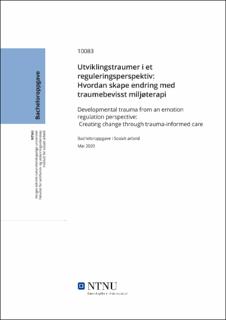| dc.contributor.advisor | Bell, David Andreas | |
| dc.contributor.author | Helde, Ingrid | |
| dc.date.accessioned | 2021-09-28T18:43:53Z | |
| dc.date.available | 2021-09-28T18:43:53Z | |
| dc.date.issued | 2020 | |
| dc.identifier | no.ntnu:inspera:56776074:22064436 | |
| dc.identifier.uri | https://hdl.handle.net/11250/2785626 | |
| dc.description.abstract | I oppveksten vil omsorgspersonene ha sterk innvirkning på barnets utvikling. Ved mangler i omsorg og reguleringsstøtte, vil barna senere kunne oppleve utfordringer med å regulere egne følelser. Dersom mønster av manglende reguleringsstøtte kombineres med traumatiske hendelser i oppveksten, omtales dette som utviklingstraumer. Oppgaven vil, ved bruk av litteraturstudie som metode, belyse hvordan man kan forstå og skape endring hos utviklingstraumatiserte barn og unge. Jeg tar utgangspunkt i miljøterapi på barnevernsinstitusjon, hvor målet er å sikre gode og trygge oppvekstsvilkår for disse barna.
Ved hjelp av traumebevisst omsorg, toleransevinduet, triggerteori og nevrobiologiske perspektiver utforsker jeg konsekvenser av utviklingstraumer, og hvordan disse kan bedres. Oppgavens hovedfunn viser at barnets nevrale skjevutvikling kan bedres i en hverdag preget av omsorg, gode relasjoner, reguleringsstøtte og subjektiv trygghet. Miljøterapeutens oppgave er å fremme dette ved å gi regulerende omsorg og begrense triggere. Oppgaven inneholder også refleksjoner rundt miljøterapeutiske verktøy, som psykoedukasjon og somatosensorisk behandling. | |
| dc.description.abstract | Caregiver-child relations are of importance for young children’s development. An upbringing with deficiencies in care and co-regulation, could result in issues with self-regulation later in life. Developmental trauma occurs when one’s childhood is affected by lack of co-regulation, combined with traumatic experiences. In this thesis I have chosen, through a literature review, to explore ways to understand and create change for children suffering from developmental trauma. The study focuses on milieu therapy in out-of-home care, which strives to secure habile and safe conditions for the children’s upbringing.
Through trauma-informed care, the window of tolerance, theories about triggers and perspectives from neuroscience, I will explore consequences from developmental trauma, and ways to heal. This thesis’ main findings show that children’s neurological imbalance could recover through a daily life characterized by care, positive relations, co-regulation and feeling subjectively safe. Milieu therapists could promote this by providing regulative care and limiting possible triggers. The following thesis will also be discussing a few milieu therapy tools, such as psychoeducation and sensorimotor psychotherapy. | |
| dc.language | | |
| dc.publisher | NTNU | |
| dc.title | Utviklingstraumer i et reguleringsperspektiv:
Hvordan skape endring med traumebevisst miljøterapi | |
| dc.type | Bachelor thesis | |
